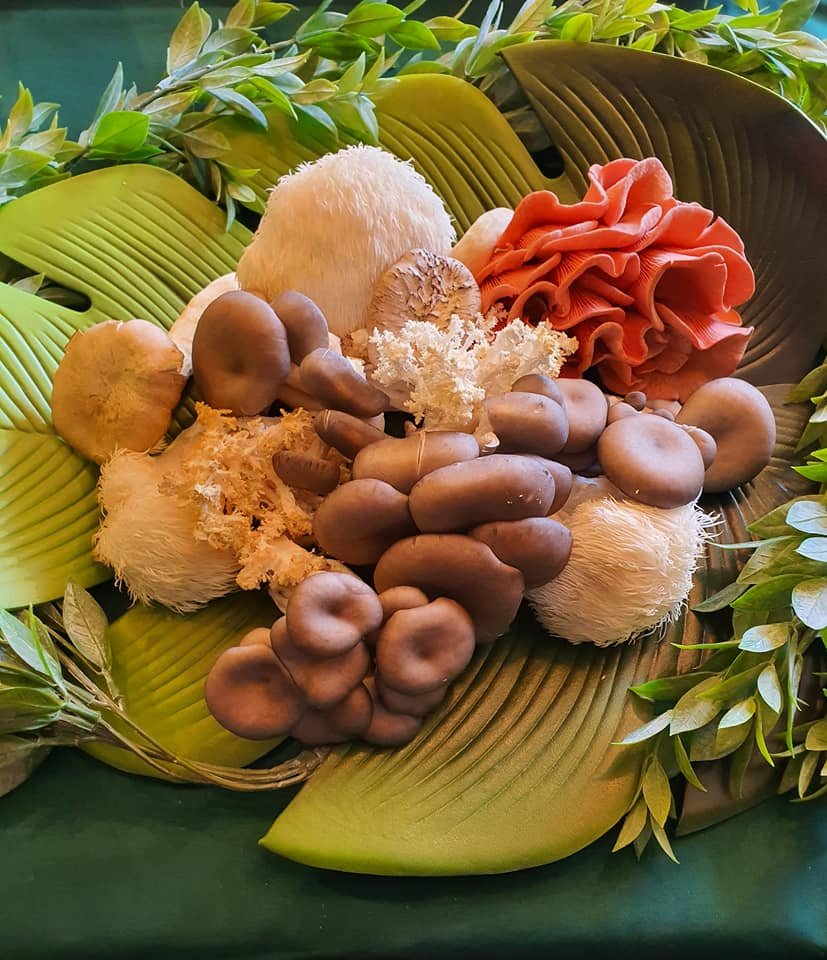Happy New Year
New Beginnings with Mushrooms: A Year of Growth and Fresh Starts!
Happy New Year, fellow fungi enthusiasts! As we embrace the fresh possibilities of a new year, I am excited to let you know that our mushroom farm has moved from the West Tamar to our new premises in Invermay. This transition marks a new chapter in our journey of cultivating and sharing the wonders of mushrooms with you.
You can find us at 5/118 Invermay Rd, Invermay, Launceston.
Open Tuesday to Saturday, 10am – 4.30pm.
Join the Mystery Mushroom Club!
Our Mystery Mushroom Club is a monthly subscription service that you either elect to pick up from the shop or post out to you a mystery mushroom variety, along with expert growing tips. Our closed WhatsApp group is a great place for members to share photos, swap advice, and celebrate their mushroom-growing successes.
Grow kits will give you up to 5 flushes depending on the variety and when it is finished, the mushroom log can be added to your soil or compost.
Join the mushroom revolution for $18 a month and grow fresh mushrooms at your place (or $30 with postage). It’s also a great gift, with monthly, three monthly and annual subscriptions.
Every month a winner is drawn for the best growing mushroom and collects not only the glory, but a prize selected from the shop, could be dried mushrooms, another grow kit, Umami powder etc.
Current Fungi Family
As a mycologist, I really enjoy nurturing a diverse range of mushroom varieties. Some are seasonal, like the pink oyster that love the warm weather, and in Tasmania that gives us a few months to grow this beauty. Other grow kits you can find in the shop include:
· Lion's Mane: Not only a culinary delight, also revered for its cognitive benefits.
Oyster: A versatile favourite that never fails to please.
Pink and Yellow Oysters: Adding a vibrant splash of colour and flavour to your dishes.
Black Pearl: A gourmet gem that’s a feast for the senses.
Blue Oyster: Striking and flavourful, perfect for any meal.
Shiitake: Look out for our kits arriving soon!
Celebrating Local Tasmanian Produce
Our shop is not only mushrooms, we proudly champion local Tasmanian produce.
Pasture raised eggs from Hillwood Fresh Food Co
Jams and preserves from Rocky Gardens Fine Food
Walnuts from Coaldale Walnuts
Honey from West Bee Honey
Organically grown heirloom seeds from Tassie Seeds
Biochar from Franks Char
Mushroom extracts from Tunnel Hill Mushrooms
Tasmanian Pepperberry products from Wild Pepper Isle
100% Guaranteed Grainspawn and Grow Kits
We are committed to quality and stand by our products with a 100% guarantee on all our grainspawn and grow kits. Whether you're a seasoned cultivator or just beginning your mushroom journey, our kits are designed to make growing mushrooms an enjoyable and rewarding experience.
Beyond fresh mushrooms, we craft :
Dried mushrooms
Lion’s Mane powder
Umami powder
Mushroom salt
Here's to a bountiful year filled with delicious mushrooms, joyous harvests, and a thriving community of fellow fungi enthusiasts!
Wishing you a wonderful New Year filled with mushroom magic! 🍄✨
Tim
Cooling off
The cooler weather has finally arrived in Tasmania after a warmer than expected autumn. This makes mushroom growing a bit easier as the main contaminants are less prominent and the species mix we can grow increases. It has become apparent temperature control is necessary for the reliable growth of all species year round so we will be looking into this and a sustainable way to achieve it.
We have perfected our agar techniques and will be working on our own distinct mushroom strains by isolating spores and finding compatible mating types.
Our goal in the future will be offering affordable mushroom classes online to share the knowledge we have gathered and help other people start growing and supplying their local communities with these delicious fungi. In a time of unreliable food networks the ability to grow your own food locally has never been more important.
Heading into the summer months
We have been mushroom farming in Tasmania for over 3 years and we find summer is the most challenging time of year. The warmer weather means our mushrooms will grow very quickly and our range of species to grow is very limited in our modified grow room which runs at the same temperature as the weather outside. To combat this we have installed a split system, powered by our Solar Panels which will keep the temperature at a much more reasonable 18 degrees Celsisus. Without the split system we would be limited to growing a few strains of Pearl Oyster, Pink Oyster and Lions Mane but the cooler temperatures will allow us to grow Pioppino, Enoki, Shiitake, King Oyster, Black Oyster, Coraltooth, Flamecaps and Elm Oysters all year round.
We are entirely self sufficient with cultures now which gives us total control over quality and quantity of all species and strains we produce and helps us to be more reliable for our many restaurant and market customers.
We are starting to play around with some new cultures to see if they can fit in to our busy growing schedule, these are the White Elf (Pleurotus Nebrodensis) and Wood Ear (Auricularia Auricula Judae).


